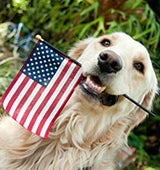
Have you had your
summer vacation yet? With school out, many families find this the perfect time
to visit their favorite relatives, camping grounds, or seek cooler climates and
beat the local heat. And unless you have a dedicated pet sitter or keep your pets
at a kennel while you’re away, you need to figure out the best way to take them
along for the ride!
Aside from the main
logistics of bringing along enough food, water, or necessary medication for
your pet, what are other considerations you should keep in mind to ensure
everyone enjoys the time away from home?
·
Call Ahead – No doubt you’ll be staying at certain locations such as
campgrounds, hotels, or with friends and family while on vacation. Make sure to
call ahead before you leave and double-check that pets are allowed on these
sites or if there’s any extra fee for boarding them there. For friends and
family, it’s just polite to make sure no one there is allergic to your pet or
otherwise uncomfortable around animals.
·
Bring Toys! – We bet your pets have a few favorite toys they love to romp with
and chomp on. Pets can be unsettled by being exposed to new and unexpected
situation or locations, but you can help alleviate their nervousness by having
a familiar toy or treat available for them to focus on—rather than wondering
what strange place they’ve wound up in.
·
Keep Their Health
Current – Before you take any
pet on a vacation, be sure to schedule an appointment with your veterinarian.
Get them to sign a health certificate, approving their ability to travel, and
also update any vaccinations so they don’t pick up any illnesses during the
trip. Have copies of their health and rabies certificate on hand at all times.
·
Keep Them Contained – Animals like to feel secure, and a moving car can be
nerve-wracking for some. Help them feel more protected by keeping them in a
kennel, a harness, a pet seat, or other restraining device so they aren’t
accidentally tossed around or injured if you have to brake hard or make a sharp
turn.
Have you planned or already taken any vacations this summer? Did
your pet come along? If so, how was the experience and what did you learn about
caring for their needs while on-the-go? If not, what steps did you take to
ensure they were cared for until you got back?


